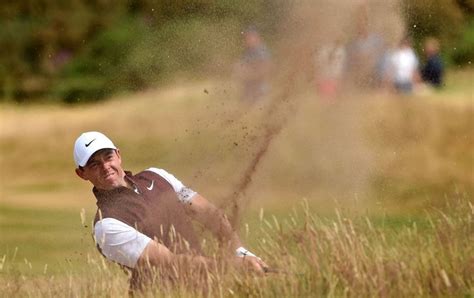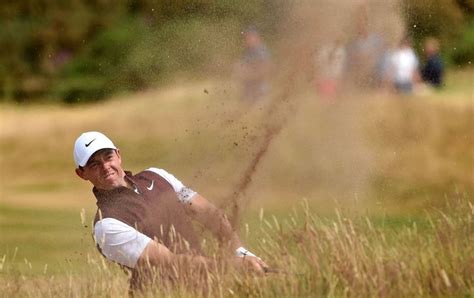
Rory McIlroy’s struggle to consistently perform at his peak has sparked questions about his motivation and drive, leaving observers wondering if the Northern Irishman can rediscover the passion that fueled his earlier successes. A period of relative stagnation, particularly in major championships, has intensified scrutiny on the four-time major winner, prompting discussions about the mental and emotional factors influencing his game.
Rory McIlroy, one of the most talented and recognizable figures in professional golf, is facing a challenging phase in his career as he grapples with maintaining peak performance and consistently contending for major championships. While he remains a formidable player with numerous victories and a prominent presence on the leaderboard, McIlroy’s inability to secure a major title since 2014 has raised concerns about his motivation and mental fortitude. This period of stagnation has led to intense scrutiny and discussions within the golf community, with many questioning whether the Northern Irishman can rekindle the fire that once propelled him to the top of the sport.
McIlroy’s early career was marked by an unparalleled combination of power, precision, and unwavering confidence. His dominant performances in major championships, including victories at the U.S. Open (2011), PGA Championship (2012, 2014), and Open Championship (2014), established him as one of the game’s brightest stars. However, since his last major win at the 2014 PGA Championship, McIlroy has experienced a series of near misses and disappointments, often failing to capitalize on promising positions in the final rounds of major tournaments.
The current questions surrounding McIlroy’s motivation stem from a perceived lack of the same intensity and focus that characterized his earlier years. While he continues to excel in regular PGA Tour events and remains a consistent contender, his performances in major championships have been inconsistent, leading to speculation about whether he possesses the same hunger and drive to win at the highest level. “He’s having trouble finding what level of enjoyment and what level of maybe not needing it,” noted one analyst, highlighting the internal conflict McIlroy may be facing.
One of the key factors contributing to McIlroy’s motivational challenges is the immense pressure and expectations that come with being one of the world’s top-ranked golfers. From a young age, McIlroy was hailed as a generational talent, and his early success only amplified the expectations placed upon him. As he has matured, McIlroy has become increasingly aware of the scrutiny he faces from fans, media, and fellow competitors, which can take a toll on his mental state.
Moreover, McIlroy’s personal life has also undergone significant changes in recent years. He married Erica Stoll in 2017 and welcomed their first child, Poppy Kennedy McIlroy, in 2020. While these life events have undoubtedly brought him immense joy and fulfillment, they have also shifted his priorities and perspectives. Balancing the demands of professional golf with the responsibilities of family life can be challenging, and it is possible that McIlroy’s focus has been diverted from the singular pursuit of major championships.
Another potential factor influencing McIlroy’s motivation is the changing landscape of professional golf. The emergence of new stars, such as Jon Rahm, Scottie Scheffler, and Viktor Hovland, has intensified the competition at the highest level. These young, hungry players are eager to make their mark on the sport, and their presence has created a more challenging environment for established stars like McIlroy.
Furthermore, the rise of LIV Golf, a Saudi-backed rival tour, has further complicated the dynamics of professional golf. The lucrative offers and relaxed schedules of LIV Golf have attracted several high-profile players, creating a divide within the sport and potentially impacting the motivation of those who have remained on the PGA Tour. While McIlroy has been a vocal critic of LIV Golf and has expressed his commitment to the PGA Tour, the ongoing controversy surrounding the rival league may have had an indirect effect on his mental state.
To rekindle his fire and return to his peak form, McIlroy needs to rediscover the joy and passion that fueled his early success. This may involve reevaluating his goals, refocusing his training regimen, and seeking guidance from mental coaches or sports psychologists. It is also crucial for McIlroy to manage his expectations and avoid placing undue pressure on himself, particularly in major championships.
One possible approach for McIlroy is to adopt a more process-oriented mindset, focusing on the day-to-day aspects of his game rather than solely fixating on the outcome of tournaments. By concentrating on improving his skills, refining his strategy, and maintaining a positive attitude, McIlroy can build momentum and confidence, which will ultimately translate into better results on the course.
Another important factor is McIlroy’s relationship with his coaching team. He has worked with several renowned coaches throughout his career, and finding the right guidance and support is crucial for his continued development. A strong coach can provide valuable insights, technical adjustments, and mental reinforcement, helping McIlroy to overcome his challenges and reach his full potential.
Ultimately, whether McIlroy can rekindle his fire and return to the top of the sport will depend on his ability to adapt, evolve, and maintain his unwavering commitment to excellence. He possesses the talent, experience, and resources to overcome his current challenges, but it will require a concerted effort to rediscover the passion and drive that made him one of the most dominant players in the world.
In-Depth Analysis
Rory McIlroy’s current predicament is a complex interplay of internal and external factors. While his talent remains undeniable, the intangible elements of motivation, mental fortitude, and competitive landscape are significantly impacting his performance.
-
Internal Pressures: McIlroy has been under immense pressure since his early successes. This pressure can manifest as anxiety, self-doubt, and a fear of failure, particularly in major championships. The weight of expectations can be a heavy burden, hindering his ability to play freely and confidently.
-
Evolving Priorities: As McIlroy has matured, his priorities have naturally shifted. The arrival of his daughter has undoubtedly changed his perspective, and balancing family life with the demands of professional golf requires careful management. While family life can be a source of strength and inspiration, it can also divert attention and energy from the singular pursuit of athletic excellence.
-
Competitive Landscape: The emergence of new stars has made the competition at the highest level more intense than ever. Players like Jon Rahm, Scottie Scheffler, and Viktor Hovland are not only incredibly talented but also possess a relentless hunger to win. This heightened competition can create additional pressure on established stars like McIlroy, forcing them to constantly adapt and improve their game.
-
LIV Golf Impact: The rise of LIV Golf has created a significant divide within the sport, with many top players lured away by lucrative offers and relaxed schedules. While McIlroy has remained loyal to the PGA Tour and has been a vocal critic of LIV Golf, the ongoing controversy surrounding the rival league may have had an indirect impact on his mental state. The constant discussions and debates about the future of professional golf can be distracting and draining, potentially affecting his focus and motivation.
-
Need for Self-Reflection: To overcome these challenges, McIlroy needs to engage in deep self-reflection. He needs to identify the root causes of his motivational struggles and develop a clear plan to address them. This may involve seeking guidance from mental coaches or sports psychologists, reevaluating his goals and priorities, and refocusing his training regimen.
-
Process-Oriented Approach: One effective strategy for McIlroy is to adopt a more process-oriented mindset. This involves focusing on the day-to-day aspects of his game, such as improving his skills, refining his strategy, and maintaining a positive attitude. By concentrating on the process rather than solely fixating on the outcome of tournaments, McIlroy can build momentum and confidence, which will ultimately translate into better results on the course.
-
Coaching and Support: McIlroy’s relationship with his coaching team is also crucial. He needs to ensure that he has the right guidance and support to overcome his challenges and reach his full potential. A strong coach can provide valuable insights, technical adjustments, and mental reinforcement, helping McIlroy to stay focused, motivated, and confident.
-
Rediscovering Joy: Ultimately, the key to McIlroy’s success lies in rediscovering the joy and passion that fueled his early success. He needs to remember why he loves the game of golf and find ways to reignite his enthusiasm. This may involve playing more casually, practicing with friends, or simply taking time to appreciate the beauty and challenge of the sport.
Background Information
Rory McIlroy’s career has been a rollercoaster of highs and lows, marked by periods of unparalleled dominance and moments of frustrating inconsistency. His early success established him as one of the game’s brightest stars, but his inability to secure a major title since 2014 has raised questions about his long-term potential.
-
Early Career: McIlroy turned professional in 2007 and quickly made a name for himself with his prodigious talent and aggressive style of play. He won his first major championship at the 2011 U.S. Open, setting a scoring record in the process. He followed that up with victories at the 2012 PGA Championship, the 2014 Open Championship, and the 2014 PGA Championship, establishing himself as one of the most dominant players in the world.
-
Post-2014 Struggles: Since his last major win in 2014, McIlroy has experienced a series of near misses and disappointments. He has consistently contended in major championships, but he has often failed to capitalize on promising positions in the final rounds. This has led to speculation about his mental fortitude and ability to handle pressure in the biggest moments.
-
Regular PGA Tour Success: Despite his struggles in major championships, McIlroy has continued to excel in regular PGA Tour events. He has won numerous tournaments and has consistently ranked among the top players in the world. This suggests that his talent and skill are not in question, but rather his ability to translate that talent into major championship success.
-
Personal Life Changes: McIlroy’s personal life has also undergone significant changes in recent years. He married Erica Stoll in 2017 and welcomed their first child, Poppy Kennedy McIlroy, in 2020. These life events have undoubtedly brought him immense joy and fulfillment, but they have also shifted his priorities and perspectives.
-
LIV Golf Controversy: The rise of LIV Golf has further complicated the dynamics of professional golf. The lucrative offers and relaxed schedules of LIV Golf have attracted several high-profile players, creating a divide within the sport and potentially impacting the motivation of those who have remained on the PGA Tour. McIlroy has been a vocal critic of LIV Golf and has expressed his commitment to the PGA Tour, but the ongoing controversy surrounding the rival league may have had an indirect effect on his mental state.
Expanded Context
The questions surrounding Rory McIlroy’s motivation are not unique to him. Many athletes, particularly those who have achieved early success, face similar challenges as they progress through their careers.
-
Burnout: One common issue is burnout. Athletes who have trained and competed at a high level for many years can experience physical and mental exhaustion, leading to a decline in motivation and performance. Burnout can be caused by a variety of factors, including overtraining, lack of rest, excessive pressure, and a loss of enjoyment in the sport.
-
Complacency: Another potential issue is complacency. Athletes who have achieved significant success may become complacent, losing the hunger and drive that propelled them to the top. Complacency can lead to a decline in training intensity, a lack of attention to detail, and a diminished competitive spirit.
-
External Distractions: External distractions can also impact an athlete’s motivation and performance. These distractions can include personal issues, financial concerns, media scrutiny, and the demands of fame. It is important for athletes to manage these distractions effectively and maintain their focus on their goals.
-
Importance of Mental Toughness: Mental toughness is crucial for athletes to overcome these challenges. Mental toughness involves the ability to stay focused, motivated, and confident in the face of adversity. It also involves the ability to manage pressure, control emotions, and bounce back from setbacks.
-
Seeking Professional Help: Many athletes benefit from seeking professional help from mental coaches or sports psychologists. These professionals can provide valuable insights, strategies, and support to help athletes overcome their challenges and reach their full potential. They can help athletes to manage stress, improve focus, build confidence, and develop mental toughness.
-
Role of Coaches and Mentors: Coaches and mentors also play a crucial role in helping athletes to maintain their motivation and performance. They can provide guidance, support, and encouragement, helping athletes to stay on track and achieve their goals. They can also help athletes to identify and address any underlying issues that may be affecting their motivation or performance.
FAQ: Rory McIlroy’s Motivation Muddle
1. Why is Rory McIlroy’s motivation being questioned?
Rory McIlroy’s motivation is being questioned due to his inability to secure a major championship victory since 2014. Despite consistently performing well in regular PGA Tour events, his struggles in major tournaments have raised concerns about his mental fortitude and drive to win at the highest level.
2. What factors might be contributing to McIlroy’s motivational challenges?
Several factors could be contributing to McIlroy’s motivational challenges, including the immense pressure and expectations placed upon him, evolving priorities due to personal life changes (marriage and fatherhood), the increasingly competitive landscape of professional golf with the emergence of new stars, and the distractions caused by the rise of LIV Golf.
3. How can McIlroy rekindle his fire and return to his peak form?
To rekindle his fire, McIlroy needs to rediscover the joy and passion that fueled his early success. This may involve reevaluating his goals, refocusing his training regimen, seeking guidance from mental coaches or sports psychologists, adopting a more process-oriented mindset, and ensuring he has the right coaching and support team.
4. What role does mental toughness play in McIlroy’s current situation?
Mental toughness is crucial for McIlroy to overcome his challenges. It involves the ability to stay focused, motivated, and confident in the face of adversity. He needs to manage pressure, control emotions, and bounce back from setbacks to perform his best in major championships.
5. Has McIlroy addressed the concerns about his motivation?
The article suggests, through analyst observations, that McIlroy is struggling to find the right balance between enjoying the game and feeling the need to win. While the article does not explicitly state McIlroy’s direct comments on his motivation, the underlying issue is discussed. Further interviews or statements from McIlroy would provide more clarity.
Quotes and Attribution
- “He’s having trouble finding what level of enjoyment and what level of maybe not needing it,” (Analyst Observation, Yahoo Sports).
Conclusion
Rory McIlroy’s journey is a testament to the complexities of maintaining peak performance in professional sports. While his talent remains undeniable, the intangible elements of motivation, mental fortitude, and competitive spirit are crucial for his continued success. By addressing the challenges he faces and rediscovering his passion for the game, McIlroy can rekindle his fire and return to the top of the sport. His path forward requires introspection, adaptation, and an unwavering commitment to excellence, navigating the pressures, personal priorities, and the evolving landscape of professional golf.









